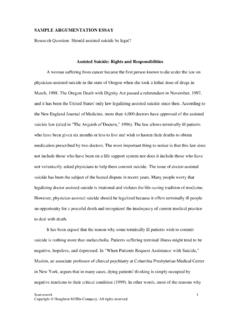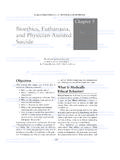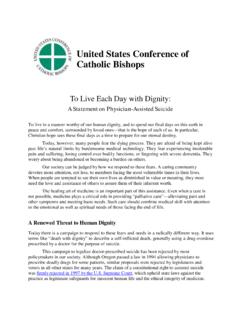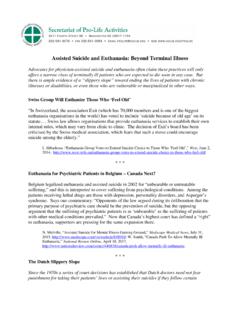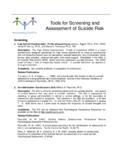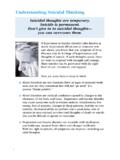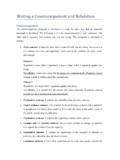Transcription of Termination of Life on Request and Assisted …
1 Termination of life on Request and Assisted suicide (Review Procedures) Act - This Act entered into force on April 1, 2002 - Review procedures of Termination of life on Request and Assisted suicide and amendment to the Penal Code (Wetboek van Strafrecht). and the Burial and Cremation Act (Wet op de lijkbezorging). We Beatrix, by the grace of God, Queen of the Netherlands, Princess of Oranje- Nassau, etc., etc. etc. Greetings to all who shall see or hear these presents! Be it known: Whereas We have considered that it is desired to include a ground for exemption from criminal liability for the physician who with due observance of the requirements of due care to be laid down by law terminates a life on Request or assists in a suicide of another person, and to provide a statutory notification and review procedure;. We, therefore, having heard the Council of State, and in consultation with the States General, have approved and decreed as We hereby approve and decree: Chapter I.
2 Definitions of Terms Article 1. For the purposes of this Act: a. Our Ministers mean the Ministers of Justice and of Health, Welfare and Sports;. b. Assisted suicide means intentionally assisting in a suicide of another person or procuring for that other person the means referred to in Article 294 second pragraph, second sentence of the Penal code;. c. the physician means the physician who according to the notification has terminated a life on Request or Assisted in a suicide ;. d. the consultant means the physician who has been consulted with respect to the intention by the physician to terminate a life on Request or to assist in a suicide ;. e. the providers of care mean the providers of care referred to in Article 446 first paragraph of Book 7 of the Civil Code (Burgerlijk Wetboek);. f. the committee means a regional review committee referred to in Article 3;. g. the regional inspector means the regional inspector of the Health Care Inspectorate of the Public Health Supervisory Service.
3 Chapter II. Requirements of Due Care Article 2. 1. The requirements of due care, referred to in Article 293 second paragraph Penal Code mean that the physician: a. holds the conviction that the Request by the patient was voluntary and well- considered, b. holds the conviction that the patient's suffering was lasting and unbearable, c. has informed the patient about the situation he was in and about his prospects, d. and the patient hold the conviction that there was no other reasonable solution for the situation he was in, e. e. has consulted at least one other, independent physician who has seen the patient and has given his written opinion on the requirements of due care, referred to in parts a - d, and f. has terminated a life or Assisted in a suicide with due care. 2. If the patient aged sixteen years or older is no longer capable of expressing his will, but prior to reaching this condition was deemed to have a reasonable understanding of his interests and has made a written statement containing a Request for Termination of life , the physician may cant' out this Request .
4 The requirements of due care, referred to in the first paragraph, apply mutatis mutandis. 3. If the minor patient has attained an age between sixteen and eighteen years and may be deemed to have a reasonable understanding of his interests, the physician may cant' out the patient's Request for Termination of life or Assisted suicide , after the parent or the parents exercising parental authority and/or his guardian have been involved in the decision process. 4. If the minor patient is aged between twelve and sixteen years and may be deemed to have a reasonable understanding of his interests, the physician may cant' out the patient's Request , provided always that the parent or the parents exercising parental authority and/or his guardian agree with the Termination of life or the Assisted suicide . The second paragraph applies mutatis mutandis. Chapter Ill. The Regional Review Committees for Termination of life on Request and Assisted suicide . Paragraph 1: Establishment, composition and appointment Article 3.
5 1. There are regional committees for the review of notifications of cases of Termination of life on Request and assistance in a suicide as referred to in Article 293 second paragraph or 294 second paragraph second sentence, respectively, of the Penal Code. 2. A committee is composed of an uneven number of members, including at any rate one legal specialist, also chairman, one physician and one expert on ethical or philosophical issues'. The committee also contains deputy members of each of the, categories listed in the first sentence. Article 4. 1. The chairman and the members, as well as the deputy members are appointed by Our Ministers for a period of six years. They may be re-appointed one time for another period of six years. `philosophical issues' -- in the original text the Dutch word `zingevingsvraagstukken' is used to describe the discussion on the prerequisites for a meaningful life . 2. A committee has a secretary and one or more deputy secretaries, all legal specialists, appointed by Our Ministers.
6 The secretary has an advisory role in the committee meetings. 3. The secretary may solely be held accountable by the committee for his activities for the committee. Paragraph 2: Dismissal Article 5. Our Ministers may at any time dismiss the chairman and the members, as well as the deputy members at their own Request . Article 6. Our Ministers may dismiss the chairman and the members, as well as the deputy members for reasons of unsuitability or incompetence or for other important reasons. Paragraph 3: Remuneration Article 7. The chairman and the members, as well as the deputy members receive a holiday allowance as well as a reimbursement of the travel and accommodation expenses according to the existing government scheme insofar as these expenses are not otherwise reimbursed from the State Funds. Paragraph 4: Duties and powers Article 8. 1. The committee assesses on the basis of the report referred to in Article 7 second paragraph of the Burial and Cremation Act whether the physician who has terminated a life on Request or Assisted in a suicide has acted in accordance with the requirements of due care, referred to in Article 2.
7 2. The committee may Request the physician to supplement his report in writing or verbally, where this is necessary for a proper assessment of the physician's actions. 3. The committee may make enquiries at the municipal autopsist, the consultant or the providers of care involved where this is necessary for a proper assessment of the physician's actions. Article 9. 1. The committee informs the physician within six weeks of the receipt of the report referred to in Article 8 first paragraph in writing of its motivated opinion. 2. The committee informs the Board of Procurators General and the regional health care inspector of its opinion: a. if the committee is of the opinion that the physician has failed to act in accordance with the requirements of due care, referred to in Article 2;. or b. if a situation occurs as referred to in Article 12, final sentence of the Burial and Cremation Act. The committee shall inform the physician of this. 3. The term referred to in the first paragraph may be extended one time by a maximum period of six weeks.
8 The committee shall inform the physician of this. 4. The committee may provide a further, verbal explanation on its opinion to the physician. This verbal explanation may take place at the Request of the committee or at the Request of the physician. Article 10. The committee is obliged to provide all information to the public prosecutor, at his Request , which he may need: 1. for the benefit of the assessment of the physician's actions in the case referred to in Article 9 second paragraph;or 2. for the benefit of a criminal investigation. The committee shall inform the physician of any provision of information to the public prosecutor. Paragraph 6: Working method Article 11. The committee shall ensure the registration of the cases of Termination of life or Assisted suicide reported for assessment. Further rules on this may be laid down by a ministerial regulation by Our Ministers. Article 12. 1. An opinion is adopted by a simple majority of votes. 2. An opinion may only be adopted by the committee provided all committee members have participated in the vote.
9 Article 13. At least twice a year, the chairmen of the regional review committees conduct consultations with one another with respect to the working method and the performance of the committees. A representative of the Board of Procurators General and a representative of the Health Care Inspectorate of the Public Health Supervisory Service are invited to attend these consultations. Paragraph 7: Secrecy and Exemption Article 14. The members and deputy members of the committee are under an obligation of secrecy to keep confidential any information acquired in the performance of their duties, except where any statutory regulation obliges them to divulge this information or where the necessity to divulge information ensues from their duties. Article 15. A member of the committee that serves on the committee in the treatment of a case exempts himself and may be challenged if there are facts or circumstances that may affect the impartiality of his opinion. Article 16. A member, a deputy member and the secretary of the committee refrain from rendering an opinion on the intention by a physician to terminate a life on Request or to assist in a suicide .
10 Paragraph 8: Report Article 17. 1. Not later than 1 April, the committees issue a joint annual report to Our Ministers on the activities of the past calendar year. Our Ministers shall lay down a model for this by means of a ministerial regulation. 2. The report on the activities referred to in the first paragraph shall at any rate include the following: a. the number of reported cases of Termination of life on Request and Assisted suicide on which the committee has rendered an opinion;. b. the nature of these cases;. c. the opinions and the considerations involved. Article 18. Annually, at the occasion of the submission of the budget to the States General, Our Ministers shall issue a report with respect to the performance of the committees further to the report on the activities as referred to in Article 17 first paragraph. Article 19. 1. On the recommendation of Our Ministers, rules shall be laid down by order in council regarding the committees with respect to a. their number and their territorial jurisdiction.
